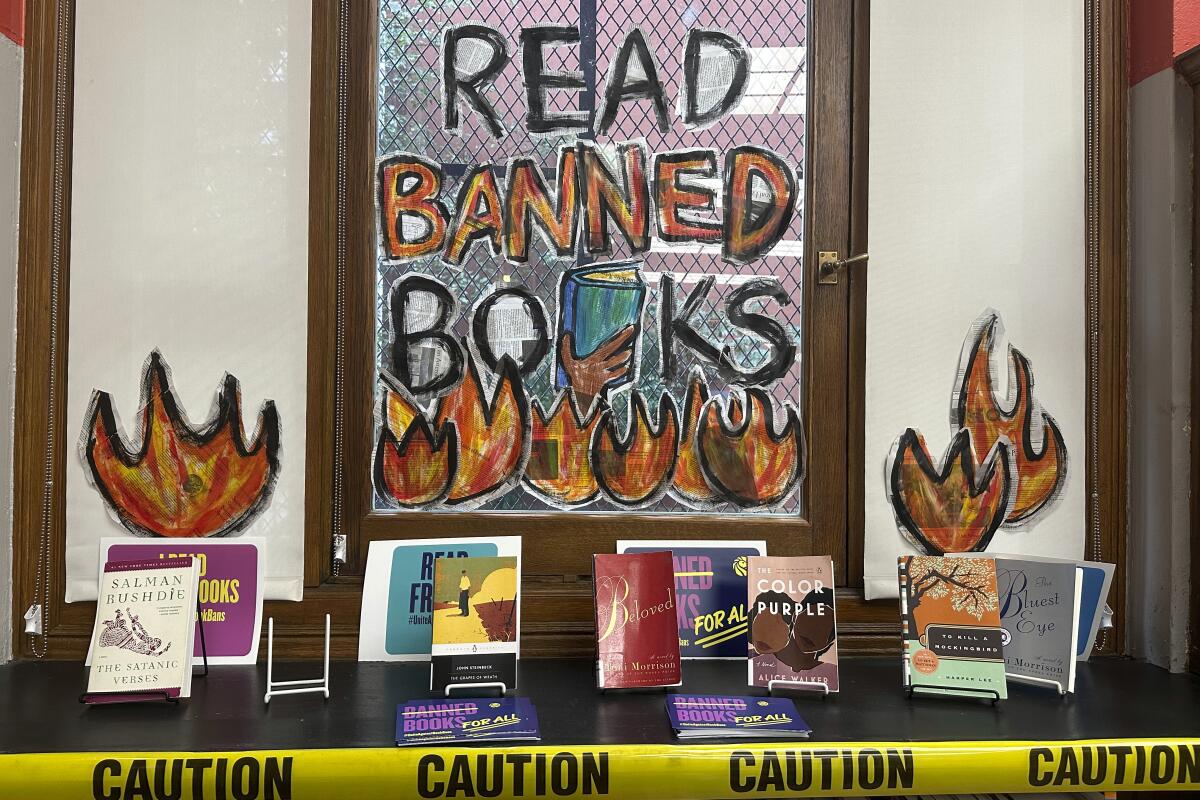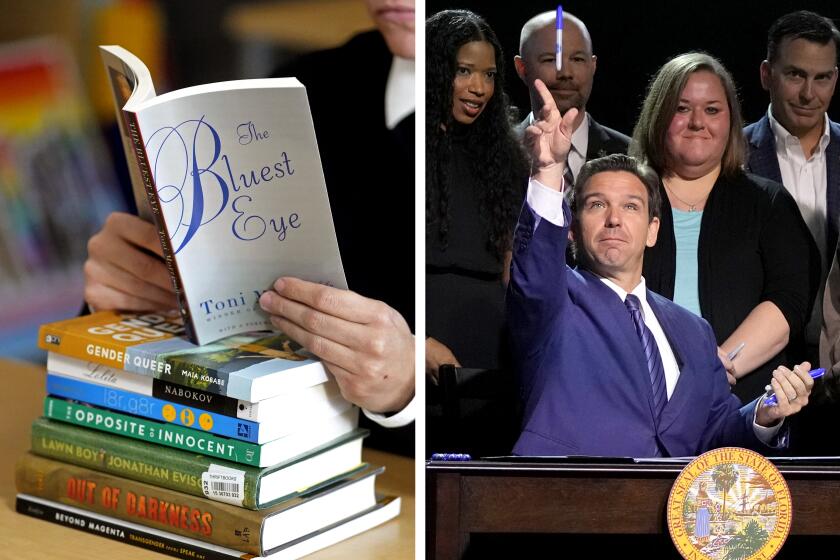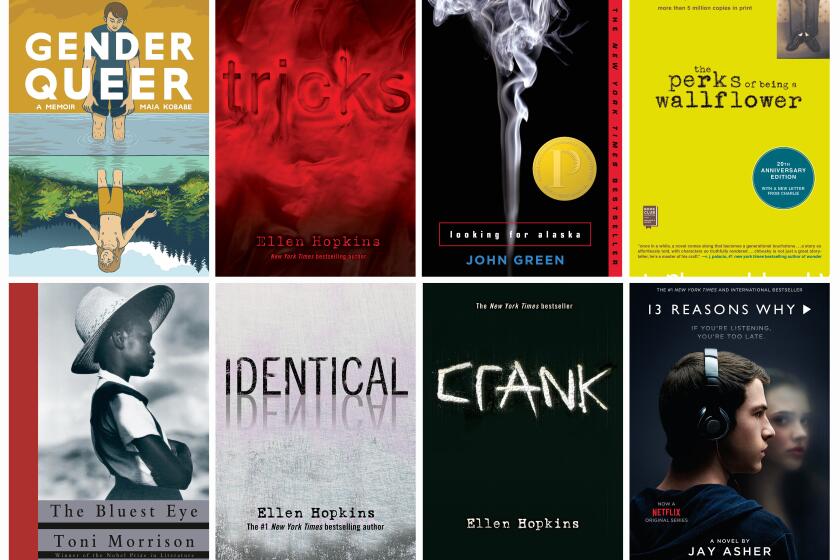From Iowa to Florida, national lawsuits against local book bans begin to gain traction

Lawsuits challenging book bans in Florida and Iowa are proving to play a key role in the growing fight for student’s access to literature.
On Wednesday, a U.S. District Judge ruled that the federal lawsuit challenging Escambia County School Board for censoring library shelves can move forward. The publishing conglomerate Penguin Random House, alongside free-speech advocacy group PEN America as well as banned authors and parents, filed the lawsuit against the Florida school district last May.
Judge Kent Wetherell said the plaintiffs have standing to pursue their claims that the school district is violating the 1st Amendment by scrubbing library shelves of books based on a political or ideological disagreement with the ideas the books express. Judge Wetherell also shot down the state’s argument that its decisions to ban books are immune from the 1st Amendment.
In May, Dan Novack, Penguin Random House vice president and associate general counsel, told The Times the publishing house was suing to stop “one of the most unsubtle attempts at viewpoint discrimination” they’d ever seen.
PEN America and publisher Penguin Random House filed a federal suit against Escambia County School District over its removal of books from school libraries.
Shalini Goel Agarwal, counsel at Protect Democracy, said in a statement that “after targeting books centering people of color and LGBTQ+ individuals and ignoring its own review committees’ recommendations, the government baldly asserted that this could not be viewpoint discrimination because the 1st Amendment does not apply to school libraries. Today’s ruling makes clear that they are wrong.”
The suit also alleged a 14th Amendment violation citing the Equal Protection Clause, because the challenged books are disproportionately titles by nonwhite and/or LGBTQ+ authors. Judge Wetherell denied the 14th Amendment claim, but ruled that 1st Amendment protections are implicated when the school district removes books based on ideology or viewpoint.
The books challenged in Escambia County include Toni Morrison’s classic novel “The Bluest Eye” and Kurt Vonnegut’s “Slaughterhouse-Five” as well Anne Frank’s “Diary of a Young Girl.” According to a list obtained by the Florida Freedom to Read Project, picture books, middle grade books, young adult titles and even five dictionaries have been banned by the county.
Since the lawsuit was filed last spring, the district has removed additional books due to new state laws, including HB 1069 — an education law, which became effective July 1, that restricts books depicting “sexual conduct” from grades deemed age-inappropriate. Recent titles affected ranged from “The Teen Vogue Handbook: An Insider’s Guide to Careers in Fashion” to a biography of the nation’s first Black United States Supreme Court justice, Thurgood Marshall.
On Tuesday, PEN America released a list of more than 1,600 challenged titles pending investigation in Escambia County.
According to PEN America’s annual book-banning report, restrictions on books have increased 33% since last year, but students offer a glimmer of hope.
“Today, we urged the court to vindicate the constitutional rights of students, parents, authors and publishers,” said Katie Blankenship, the director of PEN America, Florida. “We are heartened that Judge Wetherell agreed and that our case can proceed.”
“These books need to be returned to the shelves where they belong, and every day that students are refused access is a day they’re not getting the high-quality education they deserve,” she continued.
While Florida and Texas have become the epicenters of book banning in recent years, many other states have seen similar efforts. And one Iowa law has become another national flashpoint.
Two weeks ago, U.S. District Judge Stephen Locher granted an injunction against Iowa Senate File 496 and its book-banning provisions — just days before penalties for violating the law were planned to take effect. Enacted in May 2023, SF 496 prohibits K-12 students from accessing books including any description of sex and forbids discussing or reading about gender identity or sexual orientation through sixth grade.
Penguin Random House, again citing 1st and 14th Amendment violations, filed a lawsuit Nov. 30 — alongside the Iowa State Education Assn., critically acclaimed authors Laurie Halse Anderson, John Green, Malinda Lo and Jodi Picoult as well as a high school student, her parent and three educators.
PEN America’s latest report details the damage that book bans do to authors. ‘Matrix’ novelist Lauren Groff is on the front lines with plans to open a Florida bookshop.
Books pulled from libraries as a result of SF 496 included three novels by Toni Morrison, “Ulysses” by James Joyce, “As I Lay Dying” by William Faulkner, “Forever” by Judy Blume and more. The student who joined the suit is a senior at Urbandale High School who, as a result of SF 496, lost access to books including Alice Walker’s “The Color Purple” and Margaret Atwood’s “The Handmaid’s Tale.”
“Our mission of connecting authors and their stories to readers around the world contributes to the free flow of ideas and perspectives that is a hallmark of American democracy — and we will always stand by it,” said Nihar Malaviya, chief executive at Penguin Random House.
“We know that not every book we publish will be for every reader, but we must protect the right for all Americans, including students, parents, caregivers, teachers, and librarians, to have equitable access to books and to continue to decide what they read.”
More to Read
Sign up for our Book Club newsletter
Get the latest news, events and more from the Los Angeles Times Book Club, and help us get L.A. reading and talking.
You may occasionally receive promotional content from the Los Angeles Times.









